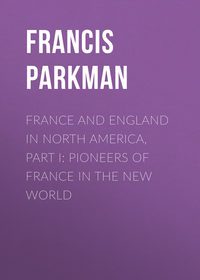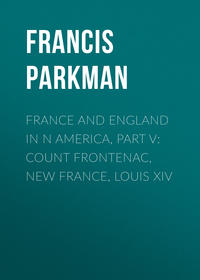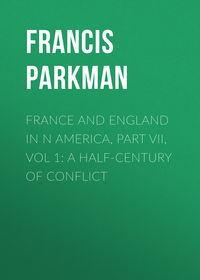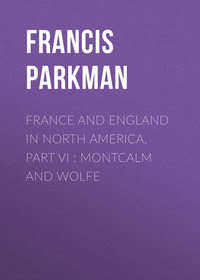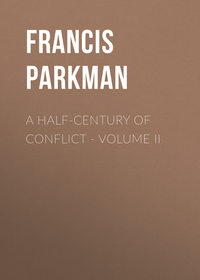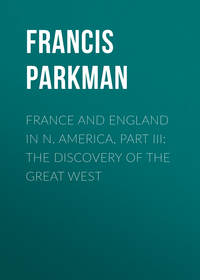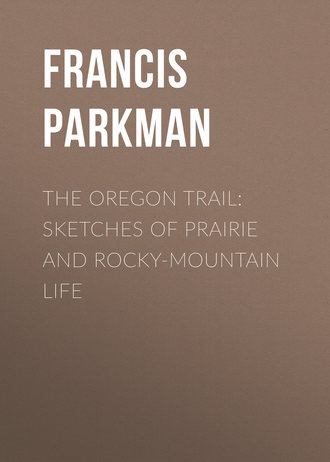 полная версия
полная версияThe Oregon Trail: Sketches of Prairie and Rocky-Mountain Life
Not a breath of air stirred over the free and open prairie; the clouds were like light piles of cotton; and where the blue sky was visible, it wore a hazy and languid aspect. The sun beat down upon us with a sultry penetrating heat almost insupportable, and as our party crept slowly along over the interminable level, the horses hung their heads as they waded fetlock deep through the mud, and the men slouched into the easiest position upon the saddle. At last, toward evening, the old familiar black heads of thunderclouds rose fast above the horizon, and the same deep muttering of distant thunder that had become the ordinary accompaniment of our afternoon’s journey began to roll hoarsely over the prairie. Only a few minutes elapsed before the whole sky was densely shrouded, and the prairie and some clusters of woods in front assumed a purple hue beneath the inky shadows. Suddenly from the densest fold of the cloud the flash leaped out, quivering again and again down to the edge of the prairie; and at the same instant came the sharp burst and the long rolling peal of the thunder. A cool wind, filled with the smell of rain, just then overtook us, leveling the tall grass by the side of the path.
“Come on; we must ride for it!” shouted Shaw, rushing past at full speed, his led horse snorting at his side. The whole party broke into full gallop, and made for the trees in front. Passing these, we found beyond them a meadow which they half inclosed. We rode pell-mell upon the ground, leaped from horseback, tore off our saddles; and in a moment each man was kneeling at his horse’s feet. The hobbles were adjusted, and the animals turned loose; then, as the wagons came wheeling rapidly to the spot, we seized upon the tent-poles, and just as the storm broke, we were prepared to receive it. It came upon us almost with the darkness of night; the trees, which were close at hand, were completely shrouded by the roaring torrents of rain.
We were sitting in the tent, when Delorier, with his broad felt hat hanging about his ears, and his shoulders glistening with rain, thrust in his head.
“Voulez-vous du souper, tout de suite? I can make a fire, sous la charette—I b’lieve so—I try.”
“Never mind supper, man; come in out of the rain.”
Delorier accordingly crouched in the entrance, for modesty would not permit him to intrude farther.
Our tent was none of the best defense against such a cataract. The rain could not enter bodily, but it beat through the canvas in a fine drizzle, that wetted us just as effectively. We sat upon our saddles with faces of the utmost surliness, while the water dropped from the vizors of our caps, and trickled down our cheeks. My india-rubber cloak conducted twenty little rapid streamlets to the ground; and Shaw’s blanket-coat was saturated like a sponge. But what most concerned us was the sight of several puddles of water rapidly accumulating; one in particular, that was gathering around the tent-pole, threatened to overspread the whole area within the tent, holding forth but an indifferent promise of a comfortable night’s rest. Toward sunset, however, the storm ceased as suddenly as it began. A bright streak of clear red sky appeared above the western verge of the prairie, the horizontal rays of the sinking sun streamed through it and glittered in a thousand prismatic colors upon the dripping groves and the prostrate grass. The pools in the tent dwindled and sunk into the saturated soil.
But all our hopes were delusive. Scarcely had night set in, when the tumult broke forth anew. The thunder here is not like the tame thunder of the Atlantic coast. Bursting with a terrific crash directly above our heads, it roared over the boundless waste of prairie, seeming to roll around the whole circle of the firmament with a peculiar and awful reverberation. The lightning flashed all night, playing with its livid glare upon the neighboring trees, revealing the vast expanse of the plain, and then leaving us shut in as by a palpable wall of darkness.
It did not disturb us much. Now and then a peal awakened us, and made us conscious of the electric battle that was raging, and of the floods that dashed upon the stanch canvas over our heads. We lay upon india-rubber cloths, placed between our blankets and the soil. For a while they excluded the water to admiration; but when at length it accumulated and began to run over the edges, they served equally well to retain it, so that toward the end of the night we were unconsciously reposing in small pools of rain.
On finally awaking in the morning the prospect was not a cheerful one. The rain no longer poured in torrents; but it pattered with a quiet pertinacity upon the strained and saturated canvas. We disengaged ourselves from our blankets, every fiber of which glistened with little beadlike drops of water, and looked out in vain hope of discovering some token of fair weather. The clouds, in lead-colored volumes, rested upon the dismal verge of the prairie, or hung sluggishly overhead, while the earth wore an aspect no more attractive than the heavens, exhibiting nothing but pools of water, grass beaten down, and mud well trampled by our mules and horses. Our companions’ tent, with an air of forlorn and passive misery, and their wagons in like manner, drenched and woe-begone, stood not far off. The captain was just returning from his morning’s inspection of the horses. He stalked through the mist and rain, with his plaid around his shoulders; his little pipe, dingy as an antiquarian relic, projecting from beneath his mustache, and his brother Jack at his heels.
“Good-morning, captain.”
“Good-morning to your honors,” said the captain, affecting the Hibernian accent; but at that instant, as he stooped to enter the tent, he tripped upon the cords at the entrance, and pitched forward against the guns which were strapped around the pole in the center.
“You are nice men, you are!” said he, after an ejaculation not necessary to be recorded, “to set a man-trap before your door every morning to catch your visitors.”
Then he sat down upon Henry Chatillon’s saddle. We tossed a piece of buffalo robe to Jack, who was looking about in some embarrassment. He spread it on the ground, and took his seat, with a stolid countenance, at his brother’s side.
“Exhilarating weather, captain!”
“Oh, delightful, delightful!” replied the captain. “I knew it would be so; so much for starting yesterday at noon! I knew how it would turn out; and I said so at the time.”
“You said just the contrary to us. We were in no hurry, and only moved because you insisted on it.”
“Gentlemen,” said the captain, taking his pipe from his mouth with an air of extreme gravity, “it was no plan of mine. There is a man among us who is determined to have everything his own way. You may express your opinion; but don’t expect him to listen. You may be as reasonable as you like: oh, it all goes for nothing! That man is resolved to rule the roost and he’ll set his face against any plan that he didn’t think of himself.”
The captain puffed for a while at his pipe, as if meditating upon his grievances; then he began again:
“For twenty years I have been in the British army; and in all that time I never had half so much dissension, and quarreling, and nonsense, as since I have been on this cursed prairie. He’s the most uncomfortable man I ever met.”
“Yes,” said Jack; “and don’t you know, Bill, how he drank up all the coffee last night, and put the rest by for himself till the morning!”
“He pretends to know everything,” resumed the captain; “nobody must give orders but he! It’s, oh! we must do this; and, oh! we must do that; and the tent must be pitched here, and the horses must be picketed there; for nobody knows as well as he does.”
We were a little surprised at this disclosure of domestic dissensions among our allies, for though we knew of their existence, we were not aware of their extent. The persecuted captain seeming wholly at a loss as to the course of conduct that he should pursue, we recommended him to adopt prompt and energetic measures; but all his military experience had failed to teach him the indispensable lesson to be “hard,” when the emergency requires it.
“For twenty years,” he repeated, “I have been in the British army, and in that time I have been intimately acquainted with some two hundred officers, young and old, and I never yet quarreled with any man. Oh, ‘anything for a quiet life!’ that’s my maxim.”
We intimated that the prairie was hardly the place to enjoy a quiet life, but that, in the present circumstances, the best thing he could do toward securing his wished-for tranquillity, was immediately to put a period to the nuisance that disturbed it. But again the captain’s easy good-nature recoiled from the task. The somewhat vigorous measures necessary to gain the desired result were utterly repugnant to him; he preferred to pocket his grievances, still retaining the privilege of grumbling about them. “Oh, anything for a quiet life!” he said again, circling back to his favorite maxim.
But to glance at the previous history of our transatlantic confederates. The captain had sold his commission, and was living in bachelor ease and dignity in his paternal halls, near Dublin. He hunted, fished, rode steeple-chases, ran races, and talked of his former exploits. He was surrounded with the trophies of his rod and gun; the walls were plentifully garnished, he told us, with moose-horns and deer-horns, bear-skins, and fox-tails; for the captain’s double-barreled rifle had seen service in Canada and Jamaica; he had killed salmon in Nova Scotia, and trout, by his own account, in all the streams of the three kingdoms. But in an evil hour a seductive stranger came from London; no less a person than R., who, among other multitudinous wanderings, had once been upon the western prairies, and naturally enough was anxious to visit them again. The captain’s imagination was inflamed by the pictures of a hunter’s paradise that his guest held forth; he conceived an ambition to add to his other trophies the horns of a buffalo, and the claws of a grizzly bear; so he and R. struck a league to travel in company. Jack followed his brother, as a matter of course. Two weeks on board the Atlantic steamer brought them to Boston; in two weeks more of hard traveling they reached St. Louis, from which a ride of six days carried them to the frontier; and here we found them, in full tide of preparation for their journey.
We had been throughout on terms of intimacy with the captain, but R., the motive power of our companions’ branch of the expedition, was scarcely known to us. His voice, indeed, might be heard incessantly; but at camp he remained chiefly within the tent, and on the road he either rode by himself, or else remained in close conversation with his friend Wright, the muleteer. As the captain left the tent that morning, I observed R. standing by the fire, and having nothing else to do, I determined to ascertain, if possible, what manner of man he was. He had a book under his arm, but just at present he was engrossed in actively superintending the operations of Sorel, the hunter, who was cooking some corn-bread over the coals for breakfast. R. was a well-formed and rather good-looking man, some thirty years old; considerably younger than the captain. He wore a beard and mustache of the oakum complexion, and his attire was altogether more elegant than one ordinarily sees on the prairie. He wore his cap on one side of his head; his checked shirt, open in front, was in very neat order, considering the circumstances, and his blue pantaloons, of the John Bull cut, might once have figured in Bond Street.
“Turn over that cake, man! turn it over, quick! Don’t you see it burning?”
“It ain’t half done,” growled Sorel, in the amiable tone of a whipped bull-dog.
“It is. Turn it over, I tell you!”
Sorel, a strong, sullen-looking Canadian, who from having spent his life among the wildest and most remote of the Indian tribes, had imbibed much of their dark, vindictive spirit, looked ferociously up, as if he longed to leap upon his bourgeois and throttle him; but he obeyed the order, coming from so experienced an artist.
“It was a good idea of yours,” said I, seating myself on the tongue of a wagon, “to bring Indian meal with you.”
“Yes, yes” said R. “It’s good bread for the prairie—good bread for the prairie. I tell you that’s burning again.”
Here he stooped down, and unsheathing the silver-mounted hunting-knife in his belt, began to perform the part of cook himself; at the same time requesting me to hold for a moment the book under his arm, which interfered with the exercise of these important functions. I opened it; it was “Macaulay’s Lays”; and I made some remark, expressing my admiration of the work.
“Yes, yes; a pretty good thing. Macaulay can do better than that though. I know him very well. I have traveled with him. Where was it we first met—at Damascus? No, no; it was in Italy.”
“So,” said I, “you have been over the same ground with your countryman, the author of ‘Eothen’? There has been some discussion in America as to who he is. I have heard Milne’s name mentioned.”
“Milne’s? Oh, no, no, no; not at all. It was Kinglake; Kinglake’s the man. I know him very well; that is, I have seen him.”
Here Jack C., who stood by, interposed a remark (a thing not common with him), observing that he thought the weather would become fair before twelve o’clock.
“It’s going to rain all day,” said R., “and clear up in the middle of the night.”
Just then the clouds began to dissipate in a very unequivocal manner; but Jack, not caring to defend his point against so authoritative a declaration, walked away whistling, and we resumed our conversation.
“Borrow, the author of ‘The Bible in Spain,’ I presume you know him too?”
“Oh, certainly; I know all those men. By the way, they told me that one of your American writers, Judge Story, had died lately. I edited some of his works in London; not without faults, though.”
Here followed an erudite commentary on certain points of law, in which he particularly animadverted on the errors into which he considered that the judge had been betrayed. At length, having touched successively on an infinite variety of topics, I found that I had the happiness of discovering a man equally competent to enlighten me upon them all, equally an authority on matters of science or literature, philosophy or fashion. The part I bore in the conversation was by no means a prominent one; it was only necessary to set him going, and when he had run long enough upon one topic, to divert him to another and lead him on to pour out his heaps of treasure in succession.
“What has that fellow been saying to you?” said Shaw, as I returned to the tent. “I have heard nothing but his talking for the last half-hour.”
R. had none of the peculiar traits of the ordinary “British snob”; his absurdities were all his own, belonging to no particular nation or clime. He was possessed with an active devil that had driven him over land and sea, to no great purpose, as it seemed; for although he had the usual complement of eyes and ears, the avenues between these organs and his brain appeared remarkably narrow and untrodden. His energy was much more conspicuous than his wisdom; but his predominant characteristic was a magnanimous ambition to exercise on all occasions an awful rule and supremacy, and this propensity equally displayed itself, as the reader will have observed, whether the matter in question was the baking of a hoe-cake or a point of international law. When such diverse elements as he and the easy-tempered captain came in contact, no wonder some commotion ensued; R. rode roughshod, from morning till night, over his military ally.
At noon the sky was clear and we set out, trailing through mud and slime six inches deep. That night we were spared the customary infliction of the shower bath.
On the next afternoon we were moving slowly along, not far from a patch of woods which lay on the right. Jack C. rode a little in advance;
The livelong day he had not spoke;
when suddenly he faced about, pointed to the woods, and roared out to his brother:
“O Bill! here’s a cow!”
The captain instantly galloped forward, and he and Jack made a vain attempt to capture the prize; but the cow, with a well-grounded distrust of their intentions, took refuge among the trees. R. joined them, and they soon drove her out. We watched their evolutions as they galloped around here, trying in vain to noose her with their trail-ropes, which they had converted into lariettes for the occasion. At length they resorted to milder measures, and the cow was driven along with the party. Soon after the usual thunderstorm came up, the wind blowing with such fury that the streams of rain flew almost horizontally along the prairie, roaring like a cataract. The horses turned tail to the storm, and stood hanging their heads, bearing the infliction with an air of meekness and resignation; while we drew our heads between our shoulders, and crouched forward, so as to make our backs serve as a pent-house for the rest of our persons. Meanwhile the cow, taking advantage of the tumult, ran off, to the great discomfiture of the captain, who seemed to consider her as his own especial prize, since she had been discovered by Jack. In defiance of the storm, he pulled his cap tight over his brows, jerked a huge buffalo pistol from his holster, and set out at full speed after her. This was the last we saw of them for some time, the mist and rain making an impenetrable veil; but at length we heard the captain’s shout, and saw him looming through the tempest, the picture of a Hibernian cavalier, with his cocked pistol held aloft for safety’s sake, and a countenance of anxiety and excitement. The cow trotted before him, but exhibited evident signs of an intention to run off again, and the captain was roaring to us to head her. But the rain had got in behind our coat collars, and was traveling over our necks in numerous little streamlets, and being afraid to move our heads, for fear of admitting more, we sat stiff and immovable, looking at the captain askance, and laughing at his frantic movements. At last the cow made a sudden plunge and ran off; the captain grasped his pistol firmly, spurred his horse, and galloped after, with evident designs of mischief. In a moment we heard the faint report, deadened by the rain, and then the conqueror and his victim reappeared, the latter shot through the body, and quite helpless. Not long after the storm moderated and we advanced again. The cow walked painfully along under the charge of Jack, to whom the captain had committed her, while he himself rode forward in his old capacity of vedette. We were approaching a long line of trees, that followed a stream stretching across our path, far in front, when we beheld the vedette galloping toward us, apparently much excited, but with a broad grin on his face.
“Let that cow drop behind!” he shouted to us; “here’s her owners!” And in fact, as we approached the line of trees, a large white object, like a tent, was visible behind them. On approaching, however, we found, instead of the expected Mormon camp, nothing but the lonely prairie, and a large white rock standing by the path. The cow therefore resumed her place in our procession. She walked on until we encamped, when R. firmly approaching with his enormous English double-barreled rifle, calmly and deliberately took aim at her heart, and discharged into it first one bullet and then the other. She was then butchered on the most approved principles of woodcraft, and furnished a very welcome item to our somewhat limited bill of fare.
In a day or two more we reached the river called the “Big Blue.” By titles equally elegant, almost all the streams of this region are designated. We had struggled through ditches and little brooks all that morning; but on traversing the dense woods that lined the banks of the Blue, we found more formidable difficulties awaited us, for the stream, swollen by the rains, was wide, deep, and rapid.
No sooner were we on the spot than R. had flung off his clothes, and was swimming across, or splashing through the shallows, with the end of a rope between his teeth. We all looked on in admiration, wondering what might be the design of this energetic preparation; but soon we heard him shouting: “Give that rope a turn round that stump! You, Sorel: do you hear? Look sharp now, Boisverd! Come over to this side, some of you, and help me!” The men to whom these orders were directed paid not the least attention to them, though they were poured out without pause or intermission. Henry Chatillon directed the work, and it proceeded quietly and rapidly. R.‘s sharp brattling voice might have been heard incessantly; and he was leaping about with the utmost activity, multiplying himself, after the manner of great commanders, as if his universal presence and supervision were of the last necessity. His commands were rather amusingly inconsistent; for when he saw that the men would not do as he told them, he wisely accommodated himself to circumstances, and with the utmost vehemence ordered them to do precisely that which they were at the time engaged upon, no doubt recollecting the story of Mahomet and the refractory mountain. Shaw smiled significantly; R. observed it, and, approaching with a countenance of lofty indignation, began to vapor a little, but was instantly reduced to silence.
The raft was at length complete. We piled our goods upon it, with the exception of our guns, which each man chose to retain in his own keeping. Sorel, Boisverd, Wright and Delorier took their stations at the four corners, to hold it together, and swim across with it; and in a moment more, all our earthly possessions were floating on the turbid waters of the Big Blue. We sat on the bank, anxiously watching the result, until we saw the raft safe landed in a little cove far down on the opposite bank. The empty wagons were easily passed across; and then each man mounting a horse, we rode through the stream, the stray animals following of their own accord.
CHAPTER VI
THE PLATTE AND THE DESERTWe were now arrived at the close of our solitary journeyings along the St. Joseph’s trail. On the evening of the 23d of May we encamped near its junction with the old legitimate trail of the Oregon emigrants. We had ridden long that afternoon, trying in vain to find wood and water, until at length we saw the sunset sky reflected from a pool encircled by bushes and a rock or two. The water lay in the bottom of a hollow, the smooth prairie gracefully rising in oceanlike swells on every side. We pitched our tents by it; not however before the keen eye of Henry Chatillon had discerned some unusual object upon the faintly-defined outline of the distant swell. But in the moist, hazy atmosphere of the evening, nothing could be clearly distinguished. As we lay around the fire after supper, a low and distant sound, strange enough amid the loneliness of the prairie, reached our ears—peals of laughter, and the faint voices of men and women. For eight days we had not encountered a human being, and this singular warning of their vicinity had an effect extremely wild and impressive.
About dark a sallow-faced fellow descended the hill on horseback, and splashing through the pool rode up to the tents. He was enveloped in a huge cloak, and his broad felt hat was weeping about his ears with the drizzling moisture of the evening. Another followed, a stout, square-built, intelligent-looking man, who announced himself as leader of an emigrant party encamped a mile in advance of us. About twenty wagons, he said, were with him; the rest of his party were on the other side of the Big Blue, waiting for a woman who was in the pains of child-birth, and quarreling meanwhile among themselves.
These were the first emigrants that we had overtaken, although we had found abundant and melancholy traces of their progress throughout the whole course of the journey. Sometimes we passed the grave of one who had sickened and died on the way. The earth was usually torn up, and covered thickly with wolf-tracks. Some had escaped this violation. One morning a piece of plank, standing upright on the summit of a grassy hill, attracted our notice, and riding up to it we found the following words very roughly traced upon it, apparently by a red-hot piece of iron:
MARY ELLIS DIED MAY 7TH, 1845.
Aged two months.
Such tokens were of common occurrence, nothing could speak more for the hardihood, or rather infatuation, of the adventurers, or the sufferings that await them upon the journey.


